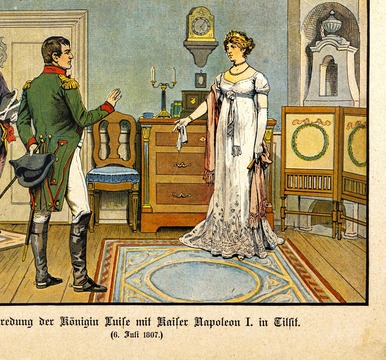The engraving depicts the embrace of the two emperors, Napoleon and Alexander I, during the discussion of the peace treaty on a raft in the middle of the Neman River in Tilsit.
At the end of the 18th century, no one saw France as a future European hegemon. This was the case until Napoleon Bonaparte, the first consul, came to power. Military reforms, skillful maneuvers, imperial chauvinism and French nationalism inflated to the skies, competent personnel policy — all this made Napoleon a military favorite in the campaign 1806–1807.
The Peace of Tilsit in 1807
was a watershed for France. A superpower emerged in Europe that no one could
challenge militarily. It was a situation that no one could have
predicted two years earlier. Indeed, even 15 years before, no one expected the
armies of then revolutionary France to be able to challenge absolutely all the
great powers of Europe — Russia, Austria, Prussia and Britain. But there it
was: the French Emperor Napoleon I embraced Alexander I. The two mortal foes,
who had been at war and competing for the past 100 years or more, concluded an
alliance. Russia was offered to make a profit from Finland at the expense of
Sweden. France would not help Turkey, which had been at war with St. Petersburg
since 1806. In exchange, Russia would undertake to help Paris in its military
campaigns (and everyone understood that this was directed against Austria,
which had poor relations with St. Petersburg), agree to the partition of
Prussia (which had lost half of its territories) and the formation of a Polish
state on its borders, and join the Continental blockade of Britain. The
continental blockade was a terrible blow to the interests of St. Petersburg’s
political and military elite. It seemed to Paris that in 1807 it had
strangled its most dangerous enemy with
sanctions, and had lured its main military ally to
its side. But the loss of the super-profitable British market quickly turned
Russia into Napoleon’s mortal enemy, with whom it would be impossible to
negotiate in the event of war. Worse still for Paris, the peace that had been
concluded meant to bring St. Petersburg even closer to Britain. Not least of
all, this was due to France’s support for Turkey and Iran in their wars with
Russia in the late 1800s. By 1812, St. Petersburg had arrived at the clear
conclusion that it had no allies on its borders, only enemies. And the only
friend that remained was London, ready to pay for imperial sovereignty by
financing another war against the Corsican.


